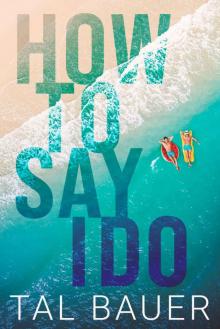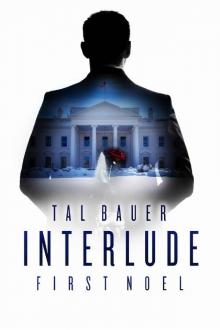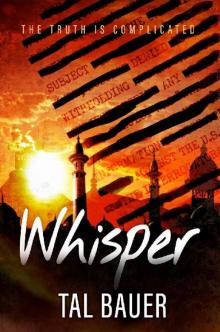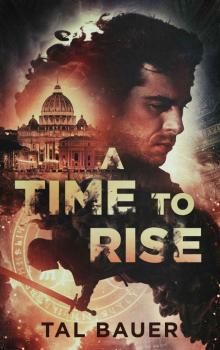How to say i do, p.1
How to Say I Do, page 1





How to Say I Do
TAL BAUER
All rights reserved.
No part of this publication may be reproduced, distributed, or transmitted in any form or by any means, including photocopying, recording, or other electronic or mechanical methods, without the prior written permission of the publisher, Tal Bauer, except in the case of brief quotations embodied in critical reviews and certain other noncommercial uses permitted by copyright law.
First Edition
10 9 8 7 6 5 4 3 2 1
Copyright © 2023 Tal Bauer
Edited by Morgan Macedo, Glasswing Editing
Cover Art by Angela Haddon Book Cover Design © Copyright 2023
Published in 2023 by Tal Bauer
United States of America
Contents
1. Wyatt
2. Noël
3. Noël
4. Noël
5. Wyatt
6. Wyatt
7. Noël
8. Noël
9. Wyatt
10. Noël
11. Wyatt
12. Noël
13. Wyatt
14. Noël
15. Noël
16. Wyatt
17. Wyatt
18. Wyatt
19. Noël
20. Noël
21. Noël
22. Noël
23. Noël
24. Wyatt
25. Wyatt
26. Noël
27. Noël
28. Noël
Acknowledgments
About the Author
Also by Tal Bauer
CHAPTER 1
Wyatt
I am my father’s son.
My father pinned a deputy sheriff badge on his chest the morning of his nineteenth birthday, and, for twenty-two years, he kept our little corner of Nowhere, Texas, safe and sound. He had a reliable streak that stretched as far as the fourteen-hour haul it took to drive from one Texas border to the other. In Texas, you don’t describe distance in miles. You talk in hours. And when you stand up and say you’re a man people can rely on, well. They do. The trust everyone put in my dad flowed like blood rivers running through the Earth.
My father's legacy lived in every part of me. I inherited his powerfully fierce need to help others, along with that everlasting McKinley dependability, and a tenaciousness that rose out of the marrow of my bones.
I was four years old when he taught me how to hold a shotgun and aim for a line of cans he’d set up on our back fence. And right before my fifth birthday, I started sneaking out of bed to watch from the upstairs landing whenever someone came pounding on our door after midnight. Those knocks meant trouble, and nighttime strangers bringing their anger to our home.
Six months later, after Dad caught me on the landing one night, he handed me his shotgun when one of those after-dark knocks came, and he positioned me so I had a clear-as-day view of him standing on our porch. My little heart was beating as fast as a mourning dove’s, but I kept that barrel level and the stock hard up against the meat of my scrawny shoulder, my eyes peeled on the two figures discussing matters beneath the melted-butter glow of our porch light.
Even when things began with fists banging on our door and bellowed curses I wasn’t supposed to repeat, they always ended with a handshake. My father knew how to take care of people. He took care of me after those shotgun midnights, too, ruffling my hair when he tucked me back into bed and calling me his “chief deputy” and my mother and baby brother’s protector.
I basked under his praise. Every time we had a school assignment that asked us what we wanted to be when we grew up, I always, always, said, “I want to be my daddy.” If I could have, I would have ditched first grade and ridden around with him in his sheriff’s truck, helping people all day long. By six, I knew how to change a tire. Dad used to let me answer his radio sometimes, sitting me on his knee as I called out “ten-four” in my little boy lisp. That radio was the background soundtrack to my childhood, humming and crackling a never-ending white noise interspersed with dispatcher calls and ten-codes and lonely late-night voices.
When they found my father's body, he was curled around my mother, and his charred bones were mixed with hers so thoroughly that it took a forensic anthropologist two days to sort out who was who. We buried them in the same coffin anyway.
Responsible. I am responsible, people say. It took me a long time to accept only a few definitions and synonyms of that word, and disavow the guilt that ran my soul raw and ragged.
So: I am my father’s son. I am the best of him left on this Earth.
Which is why I, apparently, was the only man who was going to do a damn thing about what we were all watching unfold not ten feet away. Every one of us, all strangers, were tucked into this little hole-in-the-wall airport bar in Dallas/Fort Worth International, and it was two o’clock in the afternoon. The man we were all watching, like he was a prize bull or a rodeo clown, was bellied up to the bar with a line of empty shot glasses in front of him.
He was tall and slender, with fine-boned features that called to mind aristocracies and royal lineages. He was my type, too, if I let myself think about things like that. He would have caught my attention no matter what. My gaze had locked onto him as soon as my boots crossed over the threshold of this bar, and for the past twenty minutes, an electric restlessness had built inside of me, coming out through my jiggering heel and my fingers tap-tap-tapping.
He was wearing full dress tails: a tuxedo that smelled like big money, a satin vest, and a paisley puff tie with the pearl pin, all yanked to the right, the loose knot wickedly askew. His hair was worse than disheveled, like he’d put both hands up in it and yanked. His eyes were hidden by mirrored aviators, the expensive kind that weren’t $7.99 from RaceTrac. The bartender had left behind a bottle of Grey Goose Vodka three shots ago, and now the man in the tuxedo was in a stare-down with the booze left inside that tall frosted bottle.
Forty eyeballs were glued to his rumpled jacket and trembling shoulders.
“Lemme get two of your burgers, fully dressed,” I said to the bartender, who had his eyes locked on the man in the tuxedo while he wiped down glasses like he was warming up to throw a punch. “And two extra-large orders of curly fries,” I added. “A couple glasses of water, too, sir.”
And with that, I unhooked my boot heel from the crossbar of my stool, straightened my hat, and headed down the bar.
I stopped six inches back from where he had a white-knuckled death grip on the edge of the bar top. This close, I could see his arms shaking. He smelled like he wanted to be alone—that sour rankness of abject misery and the aftereffects of an extensive pile of hours dedicated to uninterrupted drinking.
“Howdy.” I tipped the brim of my hat.
He turned, pulling down the bridge of his aviators so he could glare at me over the tops of his lenses. His eyes were bloodshot and swollen, his eyelashes thick with dried tears, and dark circles tugged on his bottom lids. He’d been crying hard, and recently, and he’d been doing his best to hide it.
His gaze flicked past my rodeo t-shirt, my overly large belt buckle, my Wranglers, and my scuffed boots before sliding back up to my hat. My hat had been my father’s—a dove-gray Cattleman, stiff after two decades of hard-earned sweat and the punishing Texan sun. My father had left it in his truck, and now it was one of three things I had left of him.
“Wow. You’re fully Texan.”
Whoever he was, he wasn’t Texan, that was for sure. I’d known that from my first peek, but his voice confirmed it. He was from back east, somewhere where there were big cities and bigger crowds. New York, probably. It was in his posture and his eyes, the way he could assess a man with a skim and a glance. That stiff arm, too, that he held against the world, screaming for no one to come near.
If a Texan had been weeping into his shot glasses at a bar, he’d have had four new friends inside of five minutes to pour out his troubles on. No one here knew what to do with a prickly, wounded man from New York City.
I smiled. “I am.” My voice had the kind of drawl that people don’t believe exists anymore, the kind you only heard in old Hollywood films or if you turned off the main highways and lost yourself in dusty towns buried off country roads and farm-to-market byways. A lady from Amarillo, who had a thick Texan voice of her own, once told me you could pour honey between my vowels and watch it puddle.
“What is this?” He flicked his hand between him and me. “Walker: Texas Ranger? Have I broken the law, cowboy? Day drinking not allowed in these parts?” His inhale was sharp and sudden. And shaky.
“Well, we usually drink Tito’s vodka here, not Goose, but there’s no law against bad taste.” I smiled again, and out of the corner of my eye, I saw a waitress with a tray loaded up with two burgers and a giant heap of curly fries slow way down after she spotted me and the man in the tuxedo. “That’ll do you in a pinch.” I nodded to the half-empty bottle of Goose, then waved to the waitress, beckoning her over.
Tuxedo Man laughed. It wasn’t a happy laugh. He didn’t sound like he was enjoying himself. He sounded, instead, like he wanted to be crying again, and would give anything to be out from under all those staring eyeballs. He slid his sunglasses back into place and turned his face to the ceiling, his eyes clenched tight enough that I could see the crinkles around the edges of his big-city lenses.
Two plates of burgers landed in front of me, followed by the fries, and then the waitress beat a trail back to the kitchen that could have left dust rolling behind her. I pushed one plate acr
His chin dipped down. He pushed his sunglasses to the top of his head, and, finally, he really looked at me. Those red-rimmed eyes of his were blazing, and his fingernails dug into the wood between us. “Yeah,” he whispered. “How about a shot of Tito’s, too?”
His name was Noël, and his story poured out in between his ravenous scarfing of his burger and half of mine. I hmmed and frowned and said “Bless” and “Lord almighty” in all the right places, picked at a few of the curly fries, and shared a single shot of Tito’s with him.
Twenty hours earlier, Noël had expected his fiancée to say “I do” at the Plaza Hotel in Midtown Manhattan, but instead of seeing her radiant smile smoothly glide down the aisle toward him, Noël heard their wedding planner whisper in his ear that everything was canceled and the wedding was off. He stood in front of their six hundred guests alone, his heart tipping backward, tumbling untethered through space, a million questions soaring through his mind. He’d spent last night pacing ruts in their empty honeymoon suite trying to reach her, needing some kind of explanation for why and what and how.
At two in morning, she’d finally texted back: I’m not in love with you. There’s someone else.
Noël arrived at JFK airport just before six a.m., booked on a 10:10 a.m. flight. He’d started downing vodka and orange juice screwdrivers there, and then kept going on board in first class, chugging tequila sunrises all the way from New York to Dallas, determined to keep his blood alcohol level stratospherically high.
“We’re supposed to be on our honeymoon,” he said around the last bite of my burger. “She’s supposed to be sitting right where you are.”
“I’m sorry.”
“Don’t be.” Noël reached for the bottle of Tito’s the bartender had swapped for the Goose. When Noël ordered us each a shot, the bartender had looked at me like I’d waded hip-deep into a rattlesnake nest. I was on my own with Noël.
He poured himself another slug of vodka. “I dodged a bullet, right? I mean, imagine if she told me after the wedding that she didn’t love me.” He tried to laugh, but it fell out of him all sharp edged and fraught. “Isn’t this the kinder way to dump someone? Split before shackling them with any need for a divorce attorney?”
I waved Noël off when he came toward my empty shot glass. “I don’t think getting left is kind at all.”
Noël knocked back his Tito’s. “We were together for eighteen months, and I just keep thinking…” He shook his head. “How long was she seeing someone else? Did it start before or after we got engaged? Who is he? And why? How—”
“Those questions don’t lead anywhere good,” I told him. “Drink some water.” I nudged my glass of water toward him. “You gotta balance out that vodka before you float away.”
He tried to smile, but it was weak. Still, he listened, and he downed half my water in one long pull.
“Fuck, please get me out of my head. Talk to me, sing to me, anything, I don’t care. Tell me: what the hell are you doing here?”
I arched my eyebrows toward our empty plates, the burgers he’d demolished, and the three left-behind fries all lost and lonely. I was taking care of him, clearly, because no one in eighteen hundred miles had stepped up before me.
“Not this.” Noël wagged his hand between us. “Why you’re talking to me is a fucking mystery, and something I’m certain you’ll regret. No, here, I mean. At the airport. You’re not from Dallas. I know people from Dallas. They’re not like this.” Another hand wave, sweeping from my boots to my hat. “You’re from… I don’t know, Amarillo or Odessa or something. Someplace actually country.”
I grinned. “I’m from a good deal farther away than Amarillo or Odessa. I’m from Central Texas, but you’d need a map and a magnifying glass to find the place.”
Noël made a face that said makes sense. He was listening to me, and seemed actually interested in what I was saying, which was damn impressive because I’d assumed his thoughts were sloshing around on the roll tide of alcohol filling his veins.
“I’m on my way to my baby brother’s wedding. Liam’s marrying his high school sweetheart. They’ve been together since they were fifteen, and you’ve never seen two people more in love than Liam and Savannah, I promise.”
All too late, I realized what I was saying. My eyes bulged and my lips parted, and I stared at Noël as he closed his eyes, laughing the same laugh a man does when he’s gambled his last dollar and lost. “I’m sorry, Noël—”
“No, don’t worry about it.” Noël wrapped his hand around the long neck of that Tito’s bottle again. This time, he poured a straight line of vodka right into my water glass, filling it up to the tippy-top. “I’m glad to hear other people are happy.” He knocked my glass back, half water, half vodka, all pain. “Happy to hear that other people are getting married,” he croaked.
A boarding call crackled over the airport’s loudspeakers, a disembodied electronic voice calling for all ticketed passengers heading to Cancun to make their way to gate E19 for immediate boarding. That was my flight, but… Well, I could get the next one. It didn’t feel right to leave Noël like this.
He’d heard the boarding call, too, though, and was listening with his head cocked like a dog. He slapped the bar top and shot me a grin. “That’s me.”
“You’re going to Cancun?”
“Sure am, on my honeymoon.”
“My brother is getting married in Cancun.”
“Well—” Noël tugged out a wad of cash from his pants pocket and flung a handful of hundred-dollar bills onto the bar, way more than two burgers and a plate of fries and ten shots of vodka were worth, even at airport prices. He snatched up the half-empty bottle of Tito’s and said to me, “We better get going.”
He had no bags and no luggage, and he went marching down the terminal with his chin up and his sunglasses in place, swinging that Tito’s like he was a sashaying pirate.
The bartender harrumphed, and two older guys in sport coats and ten-gallons at the far end of the bar raised their bourbons to me, each sporting a sardonic grin that said good luck.
I grabbed my duffel and followed Noël.
I don’t know how Noël got that vodka on the plane. I thought for sure he wouldn’t have been allowed to board the flight, but Noël was a charmer. He breezed his way through check-in and then slanted down the jetway, digging his shoulder into the wall so he wouldn’t fall to his feet.
Onboard, I followed him to the very back row, which wasn’t where his ticket said his seat was. He was supposed to be up in first class—two tickets in row two—but he handed his first class seats to a man and his wife sitting by the window at the back. They were decked out in matching Hawaiian shirts and khaki shorts, and they lit up like they’d won the lottery. They were out of their seats and up to the front of the plane in seconds.
My seat was somewhere in the middle, but when Noël plopped down and patted the cushion next to him, what was I supposed to do? Of course I stayed.
Noël unbuttoned his satin vest and unknotted his silk tie as he slumped against the window. When he sighed, I caught a buzz from the vodka on his breath, and I asked one of the flight attendants for a couple bottles of orange juice and a can of Coke.
“Oh, fantastic idea,” Noël murmured when the flight attendant returned. He took one of the orange juices and chugged half.
Hydration, I thought. Sugar. Vitamins. That’s exactly what he needs.
Then Noël pulled out that bottle of Tito’s from wherever he’d hidden it inside his tuxedo and filled his orange juice bottle the same way he’d filled up my water glass, all the way to the tippy top. He screwed the lid back on and shook it, beaming at me.

















